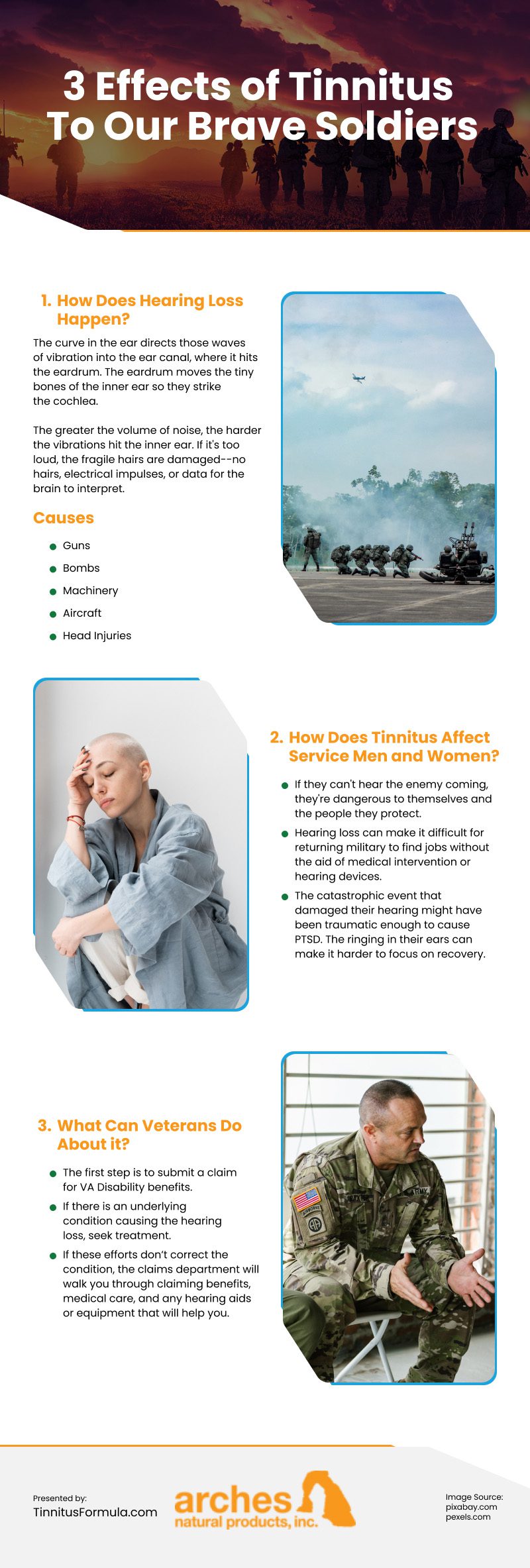By Barry Keate
Barry Keate, has lived with tinnitus over 40 years and has published 150+ research articles on numerous aspects of tinnitus. He is an expert on the condition and a well-known advocate for those with tinnitus.

(Filip Andrejevic/Unsplash)
Tinnitus, commonly described as a ringing in the ears, is the most prevalent form of disability in our armed forces. Why? How does it affect them? And what can they do about it?
An estimated 50-90% of tinnitus cases are related to hearing loss. Though there are many causes for hearing loss, a large portion of hearing loss in veterans is related to their job.
How Does Hearing Loss Happen?
The ear is a sensitive instrument. Sound causes vibrations in the air. Higher frequencies are faster vibrations, while lower frequencies vibrate slower. The curve in the ear directs those waves of vibration into the ear canal, where it hits the eardrum. The eardrum moves the tiny bones of the inner ear so they strike the cochlea.
Inside the cochlea, a tiny coiled tube, different vibrations resonate with specific cells that then contact tiny hair-like structures that send electrical impulses to the brain. The brain then interprets the electrical impulses.
The greater the volume of noise, the harder the vibrations hit the inner ear. If it’s too loud, the fragile hairs are damaged–no hairs, electrical impulses, or data for the brain to interpret. Your brain no longer receives the correct information, and you no longer hear how you used to.
Causes
There are many situations where service men and women are exposed to loud noises, either explosively or consistently, over time. Some of the most common causes are:
Guns– Our military uses everything from handguns to rockets. Discharging the weapons releases massive explosive energy, or hard sound waves, into the ear. It doesn’t matter if it is a battle scene or practice on the gun range; shooting without ear protection even once can cause damage.
Bombs– Many of the injuries seen by our military are received overseas when rockets hit the ground near our personnel or they run over a land mine or IED (Improvised Explosive Device.) Unfortunately, patrols in hostile territory need to be able to hear every sound to see an attack coming. They can’t wear ear protection like they wear body armor.
Machinery– In ships, submarines, and tanks, engine sound bounces around as it would in a metal box. Sound acts like a pinball, going from surface to surface and hitting your ear multiple times from multiple directions. Sustained exposure without hearing protection is damaging.
Aircraft– An aircraft carrier deck routinely measures sounds at 150+ decibels.
To give you an idea of how loud 150db is, a thunderclap is 120db. 150db will rupture your eardrums without ear protection. Even with protection, your ears take a beating over time.
And the crew lives below deck, sleeping through continual landings and takeoffs, never really experiencing quiet or giving their ears a break.
Head Injuries– Injuries that mess with the delicate moving parts of the ear, either directly or indirectly, can change how your ear functions.
How Does Tinnitus Affect Service Men and Women?
- Tinnitus from hearing loss makes it unsafe for that person to go into combat. If they can’t hear the enemy coming, they’re dangerous to themselves and the people they protect. Once they can no longer perform their duty, they are out of a job.
- Hearing loss can make it difficult for returning military to find jobs without the aid of medical intervention or hearing devices.
- There is a strong correlation between tinnitus and mental illness, such as depression and PTSD. The catastrophic event that damaged their hearing might have been traumatic enough to cause PTSD. So, whether it is tinnitus caused by stress (PTSD) or tinnitus from a loud noise damaging their inner ear, the results are the same. The ringing in their ears can make it harder to focus on recovery. It may drive them to rash actions, such as self-medicating to get tinnitus relief or self-harm.
What Can Veterans Do About It?
The first step is to submit a claim for VA Disability benefits. Your caseworker will request a hearing test from an approved audiologist and possibly an examination from your general practitioner to see what other health issues you might have.
Sometimes ear ringing can be as simple as a wax buildup in the ear canal. If there is an underlying condition causing the hearing loss, seek treatment. If these efforts don’t correct the condition, the claims department will walk you through claiming benefits, medical care, and any hearing aids or equipment that will help you.
The Outlook
Veterans face lasting damage for their service to our country. Still, this challenge is manageable, like so many they met in the military. There are surgeries, treatments, lifestyle changes, and herbal supplements for tinnitus that will mitigate the symptoms and improve their quality of life.
Infographic
Tinnitus, a persistent ringing in the ears, is a significant issue among military personnel, with 50–90% of cases linked to hearing loss. Exposure to loud noises during service contributes to this problem. The repercussions include cognitive strain, sleep disturbances, and psychological distress. Interventions like hearing protection and advanced hearing aids offer hope for managing tinnitus, but tackling it as a military health concern remains a pressing challenge.

Video

